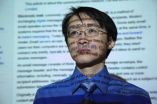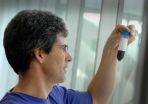(Press-News.org) Montreal, March 8, 2011 – A team of researchers from Concordia University has developed an effective new technique to determine the authorship of anonymous emails. Tests showed their method has a high level of accuracy – and unlike many other methods of ascertaining authorship, it can provide presentable evidence in courts of law. Findings on the new technique are published in the journal Digital Investigation.
"In the past few years, we've seen an alarming increase in the number of cybercrimes involving anonymous emails," says study co-author Benjamin Fung, a professor of Information Systems Engineering at Concordia University and an expert in data mining – extracting useful, previously unknown knowledge from a large volume of raw data. "These emails can transmit threats or child pornography, facilitate communications between criminals or carry viruses."
While police can often use the IP address to locate the house or apartment where an email originated, they may find many people at that address. They need a reliable, effective way to determine which of several suspects has written the emails under investigation.
Fung and his colleagues developed a novel method of authorship attribution to meet this need, based on techniques used in speech recognition and data mining. Their approach relies on the identification of frequent patterns – unique combinations of features that recur in a suspect's emails.
To determine whether a suspect has authored the target email, they first identify the patterns found in emails written by the subject. Then, they filter out any of these patterns which are also found in the emails of other suspects.
The remaining frequent patterns are unique to the author of the emails being analyzed. They constitute the suspect's 'write-print,' a distinctive identifier like a fingerprint. "Let's say the anonymous email contains typos or grammatical mistakes, or is written entirely in lowercase letters," says Fung. "We use those special characteristics to create a write-print. Using this method, we can even determine with a high degree of accuracy who wrote a given email, and infer the gender, nationality and education level of the author."
To test the accuracy of their technique, Fung and his colleagues examined the Enron Email Dataset, a collection which contains over 200,000 real-life emails from 158 employees of the Enron Corporation. Using a sample of 10 emails written by each of 10 subjects – 100 emails in all – they were able to identify authorship with an accuracy of 80 percent to 90 percent.
"Our technique was designed to provide credible evidence that can be presented in a court of law," says Fung. "For evidence to be admissible, investigators need to explain how they have reached their conclusions. Our method allows them to do this."
The new authorship identification technique was developed in collaboration with Mourad Debbabi, a Concordia expert in cyber forensics, and PhD student Farkhund Iqbal. "Our different backgrounds allowed us to apply data mining techniques to real-life problems in cyber forensics," says Fung. "This is an excellent illustration of how effective interdisciplinary research can be."
INFORMATION:
Partner in research:
This work was supported by the Natural Sciences and Engineering Research Council of Canada.
Related links:
Cited research: http://www.dfrws.org/2008/proceedings/p42-iqbal.pdf
Concordia University Faculty of Engineering and Computer Science: http://www.encs.concordia.ca
Concordia Institute for Information Systems Engineering: www.ciise.concordia.ca
Media contact:
Sylvain-Jacques Desjardins
Senior advisor, external communications
Concordia University
Phone: 514-848-2424, ext. 5068
Email: s-j.desjardins@concordia.ca
Twitter: http://twitter.com/concordianews
Concordia news: http://now.concordia.ca
Identifying 'anonymous' email authors
Concordia researchers pioneer accurate, legally admissible way to determine email authorship
2011-03-09
ELSE PRESS RELEASES FROM THIS DATE:
Spanish tourists criticize other Mediterranean countries' lack of hospitality
2011-03-09
People visiting Spain have a high opinion of the price-quality ratio of Spanish hotels. Spanish tourists, on the contrary, complain about the quality of hotels, cleanliness and hospitality in countries such as Italy, Greece and France. This is one of the conclusions of a study carried out by the University of Cádiz (UCA) on tourism in southern Mediterranean countries.
"The five aspects most-highly rated by tourists travelling in the countries of the European Mediterranean are the leisure-spectacle activities, organised routes-excursions, cultural activities, the weather ...
Aging with grace: In-home assessments lead to better care, lower health costs
2011-03-09
INDIANAPOLIS – The March 2011 issue of the journal Heath Affairs highlights an evidence-based model of geriatric care management developed, implemented and tested by researchers and clinicians from Indiana University, the Regenstrief Institute and Wishard Health Services.
Geriatric Resources for Assessment and Care of Elders (GRACE) optimizes the health and functional status of community dwelling lower income, older adults. GRACE is now in use by Wishard Health Services, the third-largest safety-net health organization in the United States; by HealthCare Partners Medical ...
Oops -- graphene oxide's solubility disappears in the wash
2011-03-09
Graphene Oxide has had a scrum of researchers fall upon it as it retains much of the properties of the highly valued super material pure Graphene, but it is much easier, and cheaper, to make in bulk quantities; easier to process; and its significant oxygen content appears to make it soluble in water. However new research led by University of Warwick Chemist Dr Jonathan P. Rourke and Physicist University of Warwick Physicist Dr Neil Wilson, has found that that last assumption is incorrect and unfortunately Graphene oxide's solubility literally comes out in the wash.
Drs ...
The cerebellum provides clues to the nature of human intelligence
2011-03-09
Milan, Italy, 8 March 2011 – Research suggests that intelligence in humans is controlled by the part of the brain known as the 'cortex', and most theories of age-related cognitive decline focus on cortical dysfunction. However, a new study of Scottish older adults, reported in the April 2011 issue of Elsevier's Cortex (http://www.sciencedirect.com/science/journal/00109452), suggests that grey matter volume in the 'cerebellum' at the back of the brain predicts cognitive ability, and keeping those cerebellar networks active may be the key to keeping cognitive decline at ...
MU chemist discovers shortcut for processing drugs
2011-03-09
COLUMBIA, Mo. – A prolific University of Missouri chemist has discovered a quicker and easier method for pharmaceutical companies to make certain drugs.
Jerry Atwood, Curator's Professor and Chair of the Department of Chemistry in the MU College of Arts and Science, has recently published a paper – his 663rd in a refereed journal – that states that highly pressurized carbon dioxide at room temperature could replace the time consuming and expensive methods currently used to manufacture certain pharmaceutical drugs.
In the article, "A New Strategy of Transforming Pharmaceutical ...
Study shows no-till's benefits for Pacific Northwest wheat growers
2011-03-09
This release is available in Spanish.
Wheat farmers in eastern Oregon and Washington who use no-till production systems can substantially stem soil erosion and enhance efforts to protect water quality, according to research by U.S. Department of Agriculture (USDA) scientists.
Agricultural Research Service (ARS) hydrologist John Williams led a study that compared runoff, soil erosion and crop yields in a conventional, intensively tilled winter wheat-fallow system and a no-till 4-year cropping rotation system. ARS is USDA's chief intramural scientific research agency, ...
Right-handers, but not left-handers, are biased to select their dominant hand
2011-03-09
Milan, Italy, 8 March 2011 – The vast majority of humans – over 90% – prefer to use their right hand for most skilled tasks. For decades, researchers have been trying to understand why this asymmetry exists. Why, with our two cerebral hemispheres and motor cortices, are we not equally skilled with both hands? A study from the University of Aberdeen in the UK, published in the April 2011 issue of Elsevier's Cortex (http://www.sciencedirect.com/science/journal/00109452), suggests that the explanation may stem from actions that require us to use both hands at the same time, ...
Boy toddlers need extra help dealing with negative emotions
2011-03-09
URBANA – The way you react to your two-year-old's temper tantrums or clinginess may lead to anxiety, withdrawal and behavior problems down the road, and the effect is more pronounced if the child is a boy who often displays such negative emotions as anger and social fearfulness, reports a new University of Illinois study.
"Young children, especially boys, may need their parents' help working through angry or fearful emotions. If you punish toddlers for their anger and frustration or act as if their fears are silly or shameful, they may internalize those negative emotions, ...
Study analyzes role of PARP enzyme in eukaryotes
2011-03-09
An Ohio State University molecular biologist leveraged a supercomputer to help better define the family tree of a group of enzymes that have been implicated in a wide range of human diseases and are important targets for anti-cancer therapies.
Along with several OSU colleagues, Rebecca S. Lamb, Ph.D., an assistant professor of Molecular Genetics, recently analyzed the evolutionary history of the poly(ADP-ribose)polymerase (PARP) superfamily.
These proteins are found in eukaryotes, a wide range of organisms – animals, plants, molds, fungi, algae and protozoa –whose ...
As we sleep, speedy brain waves boost our ability to learn
2011-03-09
Scientists have long puzzled over the many hours we spend in light, dreamless slumber. But a new study from the University of California, Berkeley, suggests we're busy recharging our brain's learning capacity during this traditionally undervalued phase of sleep, which can take up half the night.
UC Berkeley researchers have found compelling evidence that bursts of brain waves known as "sleep spindles" may be networking between key regions of the brain to clear a path to learning. These electrical impulses help to shift fact-based memories from the brain's hippocampus ...
LAST 30 PRESS RELEASES:
Billion-DKK grant for research in green transformation of the built environment
For solar power to truly provide affordable energy access, we need to deploy it better
Middle-aged men are most vulnerable to faster aging due to ‘forever chemicals’
Starving cancer: Nutrient deprivation effects on synovial sarcoma
Speaking from the heart: Study identifies key concerns of parenting with an early-onset cardiovascular condition
From the Late Bronze Age to today - Old Irish Goat carries 3,000 years of Irish history
Emerging class of antibiotics to tackle global tuberculosis crisis
Researchers create distortion-resistant energy materials to improve lithium-ion batteries
Scientists create the most detailed molecular map to date of the developing Down syndrome brain
Nutrient uptake gets to the root of roots
Aspirin not a quick fix for preventing bowel cancer
HPV vaccination provides “sustained protection” against cervical cancer
Many post-authorization studies fail to comply with public disclosure rules
GLP-1 drugs combined with healthy lifestyle habits linked with reduced cardiovascular risk among diabetes patients
Solved: New analysis of Apollo Moon samples finally settles debate about lunar magnetic field
University of Birmingham to host national computing center
Play nicely: Children who are not friends connect better through play when given a goal
Surviving the extreme temperatures of the climate crisis calls for a revolution in home and building design
The wild can be ‘death trap’ for rescued animals
New research: Nighttime road traffic noise stresses the heart and blood vessels
Meningococcal B vaccination does not reduce gonorrhoea, trial results show
AAO-HNSF awarded grant to advance age-friendly care in otolaryngology through national initiative
Eight years running: Newsweek names Mayo Clinic ‘World’s Best Hospital’
Coffee waste turned into clean air solution: researchers develop sustainable catalyst to remove toxic hydrogen sulfide
Scientists uncover how engineered biochar and microbes work together to boost plant-based cleanup of cadmium-polluted soils
Engineered biochar could unlock more effective and scalable solutions for soil and water pollution
Differing immune responses in infants may explain increased severity of RSV over SARS-CoV-2
The invisible hand of climate change: How extreme heat dictates who is born
Surprising culprit leads to chronic rejection of transplanted lungs, hearts
Study explains how ketogenic diets prevent seizures
[Press-News.org] Identifying 'anonymous' email authorsConcordia researchers pioneer accurate, legally admissible way to determine email authorship




